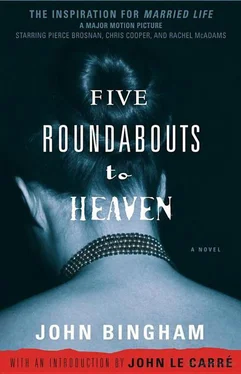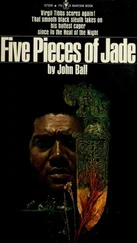John Bingham - Five Roundabouts to Heaven
Здесь есть возможность читать онлайн «John Bingham - Five Roundabouts to Heaven» весь текст электронной книги совершенно бесплатно (целиком полную версию без сокращений). В некоторых случаях можно слушать аудио, скачать через торрент в формате fb2 и присутствует краткое содержание. Жанр: Криминальный детектив, на английском языке. Описание произведения, (предисловие) а так же отзывы посетителей доступны на портале библиотеки ЛибКат.
- Название:Five Roundabouts to Heaven
- Автор:
- Жанр:
- Год:неизвестен
- ISBN:нет данных
- Рейтинг книги:4 / 5. Голосов: 1
-
Избранное:Добавить в избранное
- Отзывы:
-
Ваша оценка:
- 80
- 1
- 2
- 3
- 4
- 5
Five Roundabouts to Heaven: краткое содержание, описание и аннотация
Предлагаем к чтению аннотацию, описание, краткое содержание или предисловие (зависит от того, что написал сам автор книги «Five Roundabouts to Heaven»). Если вы не нашли необходимую информацию о книге — напишите в комментариях, мы постараемся отыскать её.
Five Roundabouts to Heaven — читать онлайн бесплатно полную книгу (весь текст) целиком
Ниже представлен текст книги, разбитый по страницам. Система сохранения места последней прочитанной страницы, позволяет с удобством читать онлайн бесплатно книгу «Five Roundabouts to Heaven», без необходимости каждый раз заново искать на чём Вы остановились. Поставьте закладку, и сможете в любой момент перейти на страницу, на которой закончили чтение.
Интервал:
Закладка:
It was, of course, the old story of the man who goes to the war-in his case, the African campaign, Italy, and Germany-and who returns to find that others have been promoted in his absence. They gave him his job back-on the road-but they pointed out, with a regret which might have been genuine, that in the present state of the wine trade they could do no more.
Bartels was not as young as he had been, and I think he felt it deeply. Moreover, good wine was not, at first, easily obtainable; and at first, being expensive, was difficult to sell.
But Beatrice had a small allowance for her clothes, and Bartels had his modest private income, so that despite everything, they managed to live reasonably. Bartels, who was of Dutch origin as his name suggests, stuck tenaciously to his selling, even though it involved an absence from home of two or three nights a week.
I spent very many happy evenings with the Bartels and with their friends. There was Fred Manders, who was an architect, and his wife, Joyce; James Murray, an insurance chap; Bill and Margaret Barnet-he was something in a textile firm; and in the country there were the Derbyshires, who had a small-holding which they farmed in a desultory kind of way; Major and Mrs Godfrey, who did nothing in particular; John O’Brien, an Irish solicitor, who lived nearby in a cottage by himself and travelled up and down to town each day, and one or two others. Of them all, I liked John O’Brien best. He was a heavily built, jovial man in his middle thirties, with dark hair and blue eyes and a pugnacious jaw.
When I first met him, he was already contemplating taking silk, and I formed the impression, and later events confirmed it, that with his good looks and Irish charm and wit he would go far at the Bar.
He lived in the country, primarily because he was passionately devoted to St Bernard dogs, of which he had three. I frequently gave him a lift to town in my car, and on Sundays, when the Bartels were down there, he generally came in for a meal or a few drinks.
We all liked John O’Brien. I still do.
I had an open invitation to go down to Balcombe any weekend I liked, with or without warning. All that I needed to do, they said, was to drive up to the door. I often did. My room was always ready. Such was the closeness of the bonds between myself and Philip and Beatrice Bartels.
So things remained for a period, which in retrospect seems like that sunny windless day when Beatrice arrived at the chateau and entered the life of Philip Bartels; the day which ended, so suddenly, in the gathering of the storm clouds and the rending of the sky by thunder and lightning and rain.
Even when the first crack appeared, I was, at first, merely surprised and saddened. It began on 12 February, when he telephoned me at my office, and invited me to lunch at the Cafe Royal, saying that he had something he wished to tell me.
I was rather busy that morning, and tried to stall him off.
“It all depends upon what you want to tell me,” I remember I answered cautiously.
He hesitated. “It is something you ought to know,” he replied at last.
“Can’t you make it tomorrow? I’ve got a hell of a lot of work to cope with.”
“It’s no good tomorrow. I really do want to see you today, alone.” Although he spoke in that slow, strong voice which contrasted so much with his appearance, I detected a note of genuine urgency in his tone.
“All right,” I said. “I’ll come.”
“See you in the cocktail lounge at one o’clock-upstairs. No, make it twelve thirty.”
“Don’t be silly. I told you I’ve got a lot of work.”
“It’ll be pointless if you don’t come at twelve thirty.”
I hesitated again. “What the hell is it about?”
“I can’t tell you on the phone.”
I thought: Oh well, I suppose I can make up the time this evening.
“All right, then. Twelve thirty. I hope it’s worth it, that’s all.”
“It’ll be worth it. I’m glad you can make it. It’s very important to me, Peter. I want your opinion.”
I took a taxi, and arrived very punctually, but he was already seated on one of the settees, and had ordered my usual gin and tonic.
Looking at him, as I walked towards him, I thought he had not changed much over the years. He was still meagrely built, whereas I had put on too much weight. There was the same wide, gentle smile. But recently he had seemed more withdrawn, at any rate when in the company of people other than myself; ironically, he trusted me implicitly.
When with other people there was a faintly enigmatic air about him. In addition to his slow, deliberate, almost tired way of speaking, he had acquired an equally deliberate way of thinking for some seconds before answering a question; and while he was thinking, he would sometimes look at you with a sardonic smile, not on his lips or even in his eyes-it was not as noticeable as that-but rather behind his eyes. It was as if he were amused, not at you, but at certain remote implications behind your question.
I put it down to the experiences, the rebuffs, which he had had “on the road.” He was not a very successful traveller for his wine firm. Had he not had a private income, he would have been hard put to it to live as he did.
The impression you had, in those days, was of one who had schooled himself to accept the disappointments of life with a kind of amused contemplation. It was as though he were patiently awaiting the end of some phase or other, before proceeding on to some unspecified destiny.
It was a queer sort of attitude, and I should say that it was hardly conducive to persuading hard-bitten wine merchants to part with their money.
He joined me in a vague toast to our mutual health, and said nothing for some moments, but sat picking at a cigarette end in the ashtray with a used match. I asked him how business was, and he said it might be worse.
I looked around the room, knowing it was useless to hurry him.
The place was filling up rapidly. Across the room three bald men were drinking cocktails. They were obese, and sat huddled forward, round a little table, their knees apart to ease the weight of their stomachs. They were animated and joking, and at the all-jolly-good-fellows stage. Later, the masks would drop, and they would get down to business.
Suddenly Bartels asked me about his wife. It was the last sort of question I anticipated.
He said: “Do you like Beatrice? I mean, are you fond of her?”
“Of course I like her,” I said. “Of course I’m fond of her. She’s a dam’ good scout. Why?”
He nodded, as though he expected the answer, as well he might have done; you are hardly likely, whatever you think, to tell your best friend that you dislike his wife.
“What are you getting at?” I asked.
“I’m fond of her, too. That’s the devil of it.”
“A lot of men are quite fond of their wives. I’m told it’s a mild kind of complaint, like chickenpox. You’ll probably get over it. But it may take time.”
He didn’t smile. He looked across the room and said: “Well, I’m going to leave Beatrice, Peter. I thought I had better tell you. I thought you ought to know.”
I have always prided myself on not showing dismay. I admire the Roman Catholic priest who said in the confessional: “You have committed murder, my son? Well, how many times?” So I took a pull at my gin and tonic, and replaced the glass on the table, and said as casually as I could:
“Oh? Why? Why are you going to leave Beatrice?”
“Because I want to be happy.”
“That’s reasonable.”
He gulped down his drink, and signalled to the waiter. But I said: “This one is on me,” and gave the order, though my own glass was still half full. When the waiter had taken the order I asked the obvious question:
Читать дальшеИнтервал:
Закладка:
Похожие книги на «Five Roundabouts to Heaven»
Представляем Вашему вниманию похожие книги на «Five Roundabouts to Heaven» списком для выбора. Мы отобрали схожую по названию и смыслу литературу в надежде предоставить читателям больше вариантов отыскать новые, интересные, ещё непрочитанные произведения.
Обсуждение, отзывы о книге «Five Roundabouts to Heaven» и просто собственные мнения читателей. Оставьте ваши комментарии, напишите, что Вы думаете о произведении, его смысле или главных героях. Укажите что конкретно понравилось, а что нет, и почему Вы так считаете.












